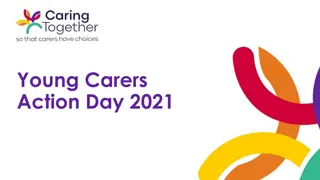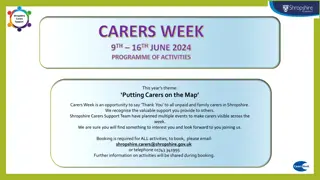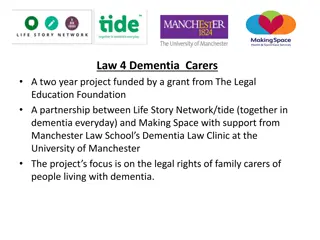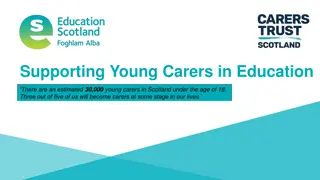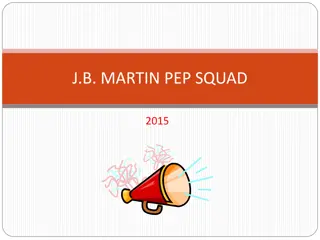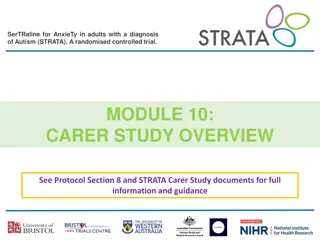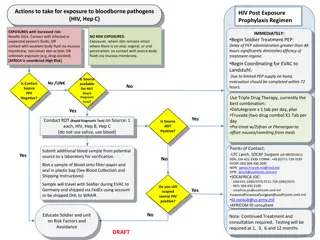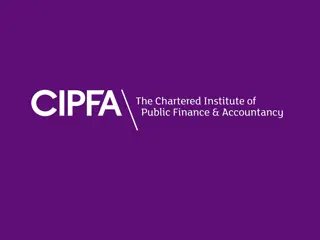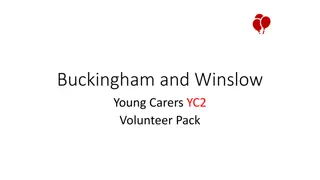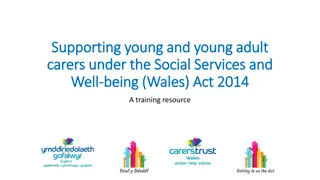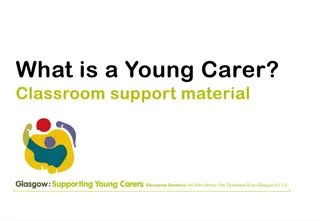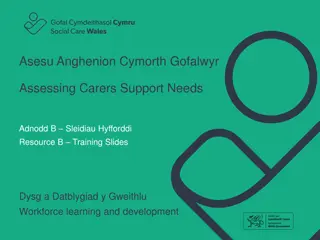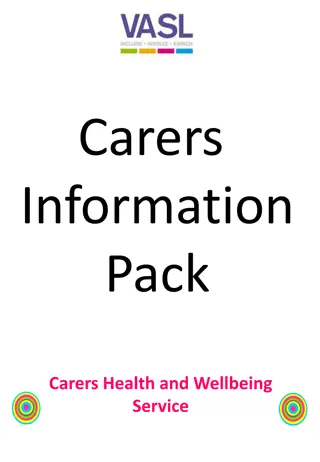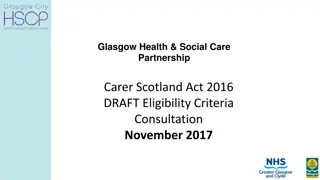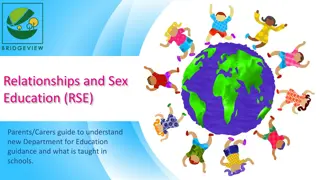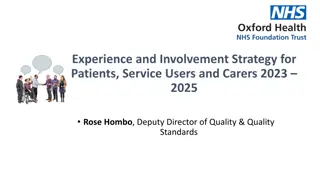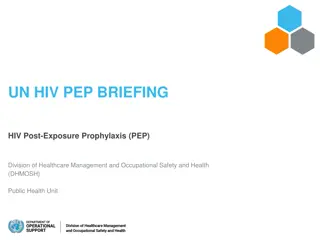Understanding Personal Education Plans (PEP) for Parents and Carers
Personal Education Plans (PEPs) are crucial tools that outline educational targets and support for children in care. PEP meetings are held termly to discuss the child's progress, achievements, and any additional support needed. It is essential for parents and carers to be actively involved in these meetings to ensure the child's educational success. Communication between social care, schools, and key stakeholders is vital in creating effective PEPs. Encouraging the child's participation and preparation for the meeting helps them feel empowered and valued in the decision-making process.
Download Presentation

Please find below an Image/Link to download the presentation.
The content on the website is provided AS IS for your information and personal use only. It may not be sold, licensed, or shared on other websites without obtaining consent from the author. Download presentation by click this link. If you encounter any issues during the download, it is possible that the publisher has removed the file from their server.
E N D
Presentation Transcript
PEP GUIDANCE FOR PARENTS AND CARERS PEP (PERSONAL EDUCATION PLAN)
HOW DOES THIS TAKE PLACE? A Personal Education Plan (PEP) contains the discussions and decisions made at a PEP meeting. PEP meetings must take place once a term for every young person in care. Local authorities have a duty to promote the educational achievement of children in care under section 52 of the Children Act 2004 and must ensure all children in care, from age three upwards have an effective, robust and up-to-date PEP. Meeting should take place in school and be led by school. The voice of the child should be heard, even if they do not want to attend their meeting. School should invite parents, carers and social workers to attend.
WHAT IS IT FOR? PEPs relate to an individual young person and they set out the young person's educational targets for attainment and achievement, and recommendations for how this will be done. Schools and colleges are accountable for ensuring all children in their care have an up-to-date PEP in place, which is reviewed on a termly basis and will be asked about these at the time of any inspection. There are always deadlines (well-publicised) for the completion of the PEPs as there is a long process of quality assurance and evaluation of financial requests that takes place after the PEP has been written.
WHAT IS TALKED ABOUT? Social care should share with school any information or details that may impact on learning. Everyone should be aware of who is the key contact is in school, the designated teacher, who should lead the meeting and share the details of the cared for child's learning and achievements. Academic assessment data and behaviour for learning information should be shared at the meeting. The cared for child will share their views of their learning and details of an additional support they would like. It is also a chance for them to ask questions about their education. Carers and social workers can also share their views.
INVOLVING THE CARED FOR CHILD Talking to a child about their education should be ongoing; however a child will benefit from preparation for their PEP meeting. This will help the young person feel part of the process and understand the purpose of the meeting. It will hopefully help them feel as if it is not just one more meeting that is happening to them, with other people making decisions about their life.
WHAT YOU CAN DO TO SUPPORT YOUR CHILD Tell them who will be at the meeting. Explain the purpose of the meeting. (A meeting to allow all those who are concerned and involved in their education to get together and find ways to help them achieve their full potential in school). Explain what will be discussed at the meeting. (The child's, school's and carer's views about their education; their strengths, weaknesses and achievements; extra curricular activities; any issues (e.g. anything relating to homework, behaviour, friendships or learning difficulties); new targets for the next 6 months; any actions that need to be carried out to help child do well in school. If the child is changing school soon, choosing GCSE options or completing GCSE coursework these would be part of the discussion too). Discuss the meeting with them and encourage them to attend. Explain how difficult it is to have a meeting about someone if they are not there and that their view is as important as anyone else's. They may need help to be clear about what they want to say. Social workers have a key role in helping them clarify their views.
POINTS TO CONSIDER Ask if there is anything they want an adult to say at the meeting that they are uncomfortable saying themselves and who they would like to say it for them. Discuss what they want to achieve and get out of school during the next six months (or longer term for older children). For example: academically, extra activities, any choices being made, any friendship/social issues, and career and college choices. Ask the child if they would like a copy of the PEP. After the meeting discuss how it went and if they agree with what was said. Check that they understand what the PEP should help them achieve.
WHAT SHOULD I ASK ? ACADEMICALLY? Are they achieving what is expected of them (in terms of the national average for their age group) in English/Maths? If not, how far behind are they and how significant is this? Why does school/child think they aren't achieving as well as they should be doing? (E.g. poor concentration, lack of motivation, learning difficulty). What can the school/carer do to help them catch up? Is the school providing the pupil with one-to-one tuition?
WHAT SHOULD I ASK ? ACADEMICALLY? Would the pupil benefit from weekly home tuition? What progress would you expect them to make in the next 6 - 12 months? If that progress isn't made do you think they should be put onto the SEN code of practice? What subjects do they enjoy the most/least? What can we do to help them enjoy the subjects they do not like much? For children with significant educational needs it is helpful to ask the school what they believe to be the over-arching educational need/focus.
WHAT SHOULD I ASK ? SOCIALLY? What are their relationships like with adults/other children? Does the child have any difficulty making and keeping friends? If this is an issue what can be done to help them? How do children/adults respond to them? Do you think they are vulnerable to bullying/have bullied others? What does the bullying look like, when is it taking place, during unstructured times? What can be done to prevent the bullying?
WHAT SHOULD I ASK? BEHAVIOUR? Are there any behavioural concerns? If so, what inappropriate behaviours do they display? What does school/child think triggers these behaviours? What lessons/times of the day do these behaviours happen e.g. playtime, maths lessons, with particular school staff or after lunch etc? What strategies have been tried to change the behaviour?
WHAT SHOULD I ASK? BEHAVIOUR? How successful were they? What else can be tried? How can the carer/social worker help? Does emotional distress affect their learning? Has the LA behaviour support team been asked for advice? If there were any exclusions, find out what they were for and how significant the school view the exclusions. Also what actions are being taken to try and improve child's behaviour and help prevent another exclusion occurring?
WHAT QUESTIONS MAY I BE ASKED? Do they bring the appropriate equipment to school? Do they do homework on time and is it done well? If there are homework issues what suggestions can school make to help child and carer? How do you encourage them to do their homework? Do you feel they enjoy reading with/to you? What interests do you think could be developed outside of school?
SETTING TARGETS It is important that the child should be asked what they would like to achieve in school over the next 6 months. 1 to 3 targets should be agreed with the child. The child's targets should be SMART: specific, measurable, achievable, realistic and timed (usually PEP targets are for the next 6 months) There should be at least one academic target and this should be related to education information discussed. Maths, English and Science should be considered priorities. There can be other targets as well e.g. allocation of mentor or buddy, a referral for educational psychologist report, social group or access to an event/institution that may promote further knowledge of a specific subject
EXAMPLES OF TARGETS I will line up when asked to, quickly and without touching anybody else. I will get the equipment I need to do my work and try to start my work on my own. If I do not understand what work I need to do I will put up my hand until an adult is able to help me. I will get to all lessons on time. I will show that I need time out (in a way agreed by the school staff) if I am feeling angry or troubled. It should be made clear which adults are going to help the child achieve their target and how they are going to help and how often (if appropriate). The progress towards achieving targets should then be reviewed at the next PEP and new targets set.
WHAT HAPPENS NEXT? A new date is set to review the PEP. This is normally in the next school term if everything is settled. However additional educational meetings can be held if there are issues that need more support or feedback. The PEP is submitted to Virtual School in a timely manner, normally within two weeks after the meeting. The PEP is quality assured, financial information logged and loaded onto LCS so that the Social worked can share as needed. Any supporting documents are also added to LCS as the PEP may be submitted with provision maps, behaviour plans, achievements, examples of work, termly reports etc.
HMMM I HAVE QUERIES? At any time you can contact the Virtual School for support or advice Contact us via email on Virtual School admin.virtualschool@tameside.gov.uk Tel : 0161 342 4057
REFERENCES Cheshire West and Chester, Personal Education Plans (PEPs) for Looked After Children, available at Personal Education Plans (PEPs) for Looked After Children (cheshirewestandchester.gov.uk), (November 2021) The designated teacher for looked-after and previously looked-after children (publishing.service.gov.uk) pages 15 to 19 , 2018 (November 2021) Oxfordshire County Council , Personal Education Plan (PEP) Toolkit, available at Personal Education Plan (PEP) Toolkit | Oxfordshire County Council (November 2021) Southwark County Council, 3.5.2 Personal Education plans , available at 3.5.2 Personal Education Plans (proceduresonline.com) (November 2021)


